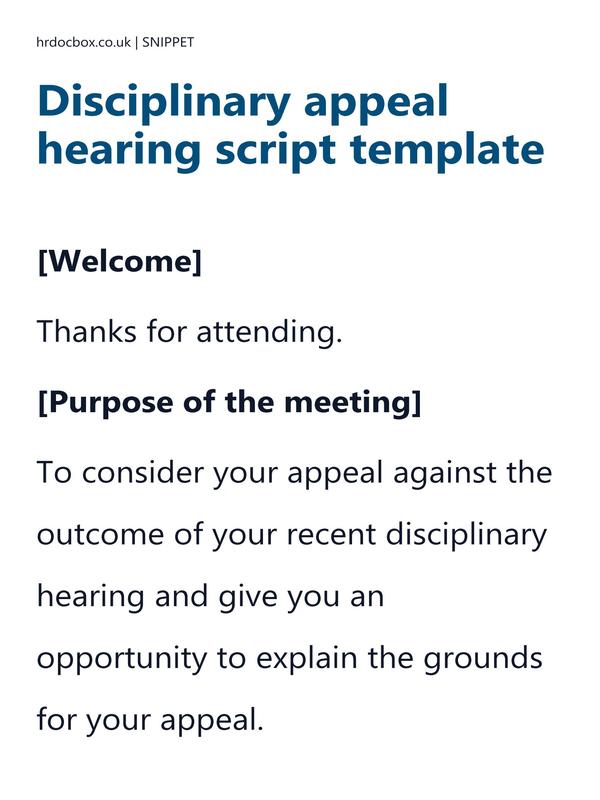Disciplinary appeal hearing script template


Our Disciplinary Appeal Hearing Script Template ensures an organised and fair process for addressing disciplinary appeals, resolving conflicts effectively.
- Includes 12 months' access to the Disciplinary appeal hearing script template, with all updates provided free of charge and notified to you.
- UK-specific accuracy.
- 193 words over 1 page.
- Last updated 20/11/2025.
- Format: Word / plain text / email.
- Delivery: Instant download after purchase (no physical item).
- Access: Download link shown here after checkout.
- This Disciplinary appeal hearing script template will SAVE you up to 30 mins drafting & research, save you money, and reduce your risk.
1 [Welcome]
1.1 Thanks for attending.
2 [Purpose of the meeting]
2.1 To consider your appeal against the outcome of your recent disciplinary hearing and give you an opportunity to explain the grounds for your appeal.
2.2 [If you have chosen to be accompanied at the hearing by a colleague or trade union official they may ask questions or read a statement on your behalf, but cannot answer questions for you].
2.3 Once you have set out the grounds for your appeal, we will then adjourn the meeting and I will decide whether to uphold the original outcome of your disciplinary hearing or amend it. This will be notified to you in writing.
2.4 Do you have any questions at this point?
3 [Grounds for appeal]
3.1 [Set out original decision]
3.1.1 You have provided a [letter/email] outlining the grounds for your appeal and I will address them in turn and ask whether you have any further comments.
3.2 [Details of ground]
3.2.1 (hear employee’s comments, and ask clarifying questions if necessary)
4 [End meeting]
4.1 Do you have any further questions, or points of clarificaton at this point?
4.2 Thank you again for attending, I will take into account everything you have said, and will consider my decision.
Disciplinary appeal hearing script template purpose
The purpose of a disciplinary appeal hearing script is to provide a structured and clear framework for conducting a disciplinary appeal hearing. The script serves as a guide for the chair of the hearing, ensuring that everyone is aware of the process and what is expected of them.
Using a disciplinary appeal hearing script can help ensure that the hearing is conducted fairly and consistently, and that all relevant information is presented and considered.
Overall, the purpose of a disciplinary appeal hearing script is to provide a fair and consistent process for hearing and considering appeals related to disciplinary actions. By using a script, employers can ensure that the hearing is conducted in a professional and structured manner, and that all parties involved are given a fair opportunity to present their case and be heard.
Practical application of a Disciplinary appeal hearing script template
- The Disciplinary appeal hearing script template should be actioned / delivered during the meeting itself.
- It is sent / delivered by an employer / HR team to an employee.
Compliance
Compliance
This Disciplinary appeal hearing script template incorporates relevant UK laws and HR standards, including those listed below:
-
Employment Rights Act 1996: This legislation sets out the minimum statutory procedures that employers must follow when taking disciplinary action against an employee. The Act provides for an employee's right to appeal against any disciplinary action taken by their employer.
-
Equality Act 2010: This legislation provides protection against discrimination on the grounds of a person's age, disability, gender, race, religion or belief, sexual orientation, or any other characteristic protected under the Act. It is important that disciplinary proceedings are conducted fairly and without discrimination or bias.
-
Human Rights Act 1998: This legislation incorporates the European Convention on Human Rights into UK law, which includes provisions for a fair hearing and access to justice. This supports the employee's right to appeal and to have their case heard in a fair and impartial manner.
-
Acas Code of Practice: This Code provides guidance on how to handle disciplinary and grievance procedures in the workplace. The Code sets out the principles of a fair procedure, including the right to appeal and the importance of providing clear reasons for any disciplinary action taken.
-
Trade Union and Labour Relations (Consolidation) Act 1992: This legislation provides employees with the right to be accompanied by a trade union representative or a workplace colleague at any disciplinary hearing. This helps to ensure that employees are supported and have someone to help present their case.
Disciplinary appeal hearing workflow
Disciplinary appeal hearing workflow
Check which resources should be implemeted before and/or after the Disciplinary appeal hearing script template, to understand the workflow.
Disciplinary decision appeal letter
Our Disciplinary Decision Appeal Letter Template supports fair processes, providing a platform for employees to address concerns and seek resolution.
Disciplinary appeal hearing outcome confirmation letter
Our Disciplinary Appeal Hearing Outcome Confirmation Letter Template ensures clear communication of the final decision, promoting fairness and transparency.
Timings
Timings
Follow these best practice actions to get the most from the Disciplinary appeal hearing script template, guiding you before, during, and after implementation:
| Step | Description | Responsibility | Timing |
| 1 | Initiate disciplinary appeal | Appellant | Within timescale set out in decision confirmation letter |
| 2 | Collect relevant documentation | HR/Supervisor | Within 2 working days of the appeal being acknowledged. |
| 3 | Schedule appeal hearing | HR | Within 5 working days of appeal letter being received. |
| 4 | Customise hearing script template | HR | Prior to the hearing |
| 5 | Conduct disciplinary appeal hearing | Chairperson/Panel | On scheduled date |
Practical example
Practical example
Scenario: Appeal Hearing for Disciplinary Action at ABC Limited
ABC Limited, a leading retail company in the UK, is holding an appeal hearing in response to an employee's appeal against a disciplinary decision. The employee, Sarah, who works as a sales associate, was issued with a written warning for repeated lateness to work.
Background
Sarah has been employed at ABC Limited for two years and has previously received positive performance evaluations. However, over the past few months, Sarah's punctuality has become an issue, with multiple instances of arriving late to her shifts.
Initial Disciplinary Action
Following a series of verbal warnings and discussions about her lateness, Sarah was issued with a written warning as per ABC Limited's disciplinary procedure. The written warning outlined the concerns about Sarah's punctuality and the potential impact on the team and business operations.
Sarah's Appeal
Sarah has appealed against the written warning, arguing that her lateness was due to unforeseen personal circumstances, including difficulties with public transport and family responsibilities. She believes that the disciplinary action taken against her was unfair and disproportionate to the situation.
The Appeal Hearing
HR Manager Emma, along with two senior managers from different departments, forms the panel for the appeal hearing. The panel convenes in a meeting room at ABC Limited's head office, with Sarah and her representative present.
Adjournment for Deliberation
The panel adjourns the hearing to deliberate on Sarah's appeal. They review the evidence presented, consider the circumstances surrounding the lateness incidents, and assess whether the disciplinary action taken was appropriate and proportionate.
Communication of Decision
Following deliberation, Emma reconvenes the hearing to finalise the panel's decision. The panel decised to uphold the written warning but agree to provide additional support and guidance to help her improve her punctuality moving forward.
Frequently Asked Questions about a Disciplinary appeal hearing script template
Frequently Asked Questions about a Disciplinary appeal hearing script template
-
Can I use the Disciplinary appeal hearing script template in my small business?
Yes. The Disciplinary appeal hearing script template is designed to be flexible and suitable for organisations of all sizes, including small businesses and charities. It follows UK employment law best practice, so even if you don't have an in-house HR team, you can confidently apply it.
-
Is the Disciplinary appeal hearing script template compliant with 2026 UK employment law?
Absolutely. Like the Disciplinary appeal hearing script template, all of our templates are drafted with the latest ACAS guidance and UK employment legislation in mind. We review and update them regularly, so you can be confident they remain compliant.
-
Can I customise the Disciplinary appeal hearing script template for my organisation?
Yes, we highlight the areas of the Disciplinary appeal hearing script template that you need to update with your own details, and where you need to make decisions to suit your situation. This saves you time and ensures that you meet best practice.
-
Do I get instant access to the Disciplinary appeal hearing script template?
Yes. Once purchased, you'll be able to download the Disciplinary appeal hearing script template instantly. Templates are provided in editable Word or Excel format so you can customise them easily, and in PDF format for easy sharing.
-
What if I need more help, not just a Disciplinary appeal hearing script template?
If you're looking for broader support, we also offer toolkits and library bundles that include the Disciplinary appeal hearing script template, along with other HR templates and policies for fully managing your situation. These may be more cost-effective if you need deeper advice.
-
Why should I use this Disciplinary appeal hearing script template, and not AI to generate it?
The risk of using a free AI-generated template 'without review' includes your legal exposure, missing context, and no awareness of the wider process, whereas purchasing the Disciplinary appeal hearing script template from us mitigates that risk.
